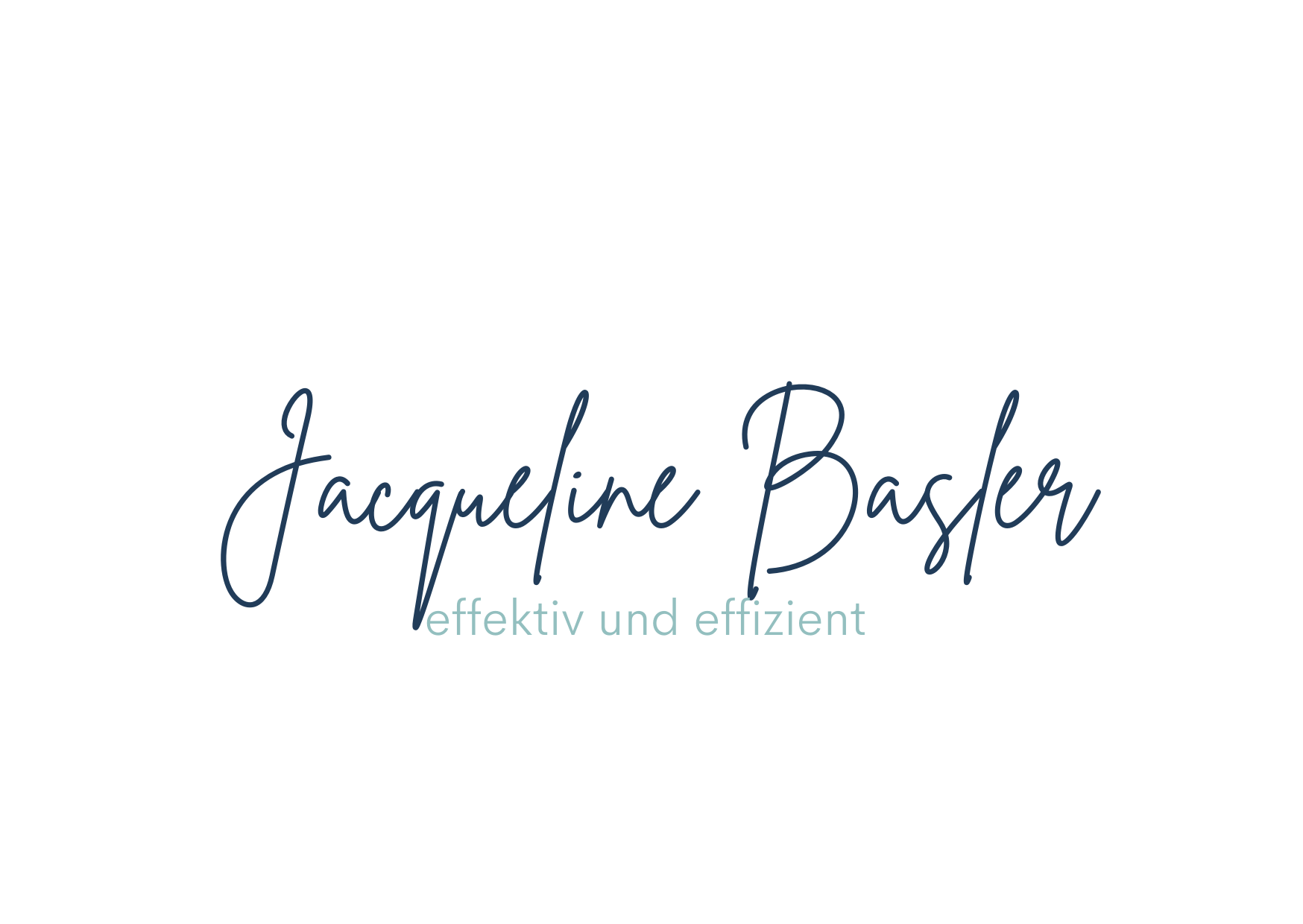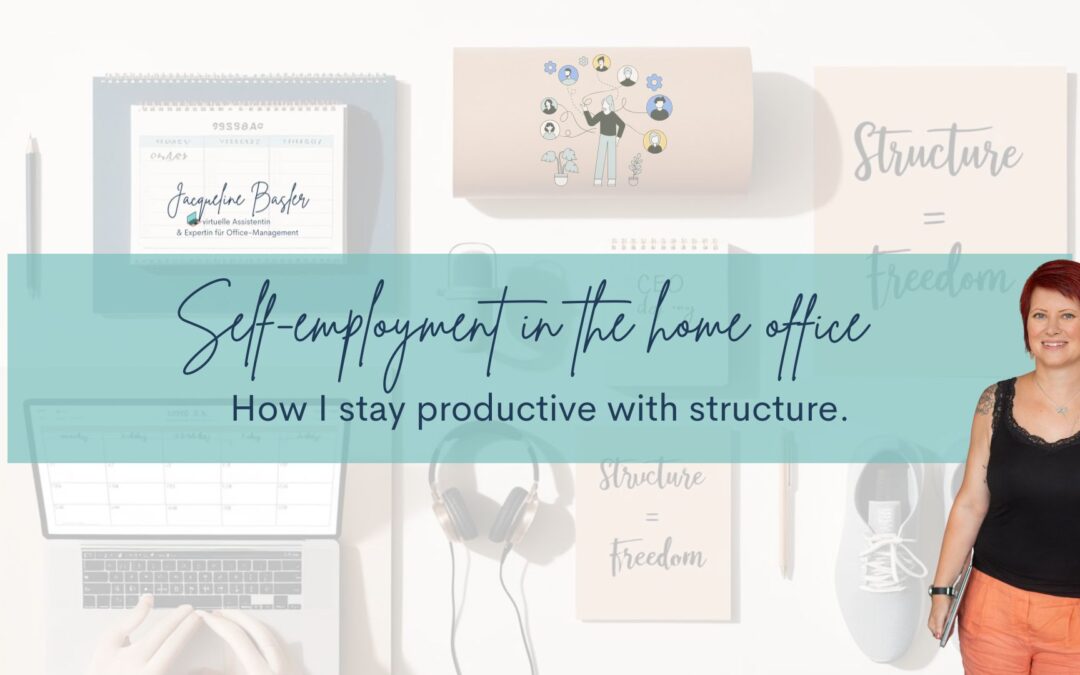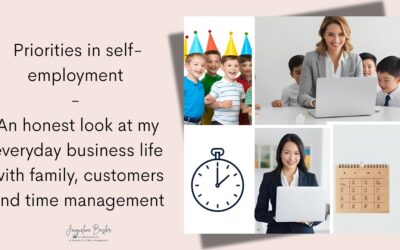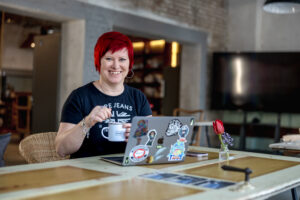Working from home as a freelancer? Here’s how I, as a virtual assistant, stay organized and productive with structure.
Hi, I’m Jacqueline – and I work from home.
“Oh, how relaxing! I wish I had a daily routine like that. Must not even feel like real work!”
Haha, sure. I just lie around all day in sweatpants, occasionally moving the cursor across my ridiculously large screen. A bit of coffee, a few emails, a little Instagram… sounds dreamy, doesn’t it?
Today, I can laugh about it. Because I know: that’s a fairytale. Working from home can be seriously challenging – especially when you’re self-employed. It takes self-discipline, clarity, structure. And sometimes, a whole lot of patience when a beautifully planned day suddenly falls apart.
Many people realized this during COVID, when everyone suddenly had to work from home. It became clear: remote work doesn’t run on autopilot. It requires focus, self-motivation – and above all, strong self-leadership.
I also remember times when I turned red whenever someone said, “If it feels that relaxed, it’s not real work.” And I actually started wondering if I was maybe too easygoing.
But let’s be honest: where does this belief come from, that work always has to feel hard and exhausting? That we can only be proud if we collapse into bed at night completely drained?
→ I looked into this question. (Spoiler: it has to do with some very old ideas – more on that later.)
In this article, I’ll share how I structure my day in the home office without sinking into chaos. How I create space for exercise, family, me-time, and new ideas for my business. And how I manage to stay grounded – even when things don’t go as planned.
Why I Sometimes Struggle Despite All the Freedom
On paper, it looks perfect: flexible hours, no commute, self-directed work. The reality? It’s more like a frantic game of Tetris.
My to-do list might have three clear tasks – and suddenly a potential new client calls with an exciting project that of course needs to start yesterday. Another project that seemed almost done turns out to be way more complex. Then there’s a random call or tech glitch that steals an hour before the day even really starts.
Add personal life – school holidays, a family birthday, or the garden calling – and everything goes off track. My beautiful weekly plan becomes a patchwork of rescheduled appointments and “I’ll do it later” notes.
I’ll be honest: I love my freedom. But it also challenges me. Because no one but me makes sure I stay focused. There’s no team lead chasing deadlines, no office lights turning off at 6 PM.
Freedom without structure?
That’s like driving without a steering wheel. Sure, you’re moving – but whether you end up where you want to be is pure luck.
What Matters to Me – and How I Create Space for It
Over time, I’ve learned what really matters to me – not just in business, but in daily life as a whole. Things that energize me, ground me, and make sure I’m not just functioning, but actually living.
“You are your best asset. Take care of yourself.” – Unknown
Movement.
I need it to get into the day – physically and mentally. 15–20 minutes of yoga, a walk, or just some stretching with music is usually enough. The main thing: I don’t dive headfirst into the to-do chaos.
Time with my family.
I work from home – but that doesn’t mean I’m always present. That’s why I try to block quality time, with no laptop, no phone, no multitasking. Doesn’t always work – but more often than not.
Room for ideas.
I love planning, brainstorming, and creating. That requires space – little creative islands where nothing is expected except dreaming and thinking.
Me-time.
And then there’s the time that often gets lost: time just for me. Meeting friends, reading, listening to music, staring into space. These aren’t luxuries – they’re necessary. Without them, I lose touch with myself – and everything else stops working too.
To create space for all this, I’ve set up a few personal anchors:
-
-
A weekly CEO day to work on my business instead of just in it.
-
Buffer times in my calendar that I don’t schedule – for the unexpected or just to breathe.
-
And most importantly: I don’t plan at 100% capacity. My week isn’t a tightrope walk – it’s a flexible structure with room to breathe.
-
“Almost everything will work again if you unplug it for a few minutes – including you.” – Anne Lamott
Of course, not every week goes according to plan. Some days everything falls apart. No workout, CEO day gets rescheduled, me-time gets scrapped. And that’s okay.
Because for me, structure doesn’t mean rigidity. It means: I know what matters to me. And I can always come back to it – even when life throws me off track.
A Peek Into My Tools & Favorite Routines
Here’s how I stay on course during the week:
♥ CEO Day: For strategy, content planning, finances & learning
♥ Morning movement: Rowing, strength training, walking, biking – at least 15 minutes
♥ Tools: Notion, Slack, 1Password, ChatGPT
♥ Me-Time: 1 afternoon per week blocked – no client calls, no obligations
♥ No 100% booking – Buffer time is a must
The Reality of Self-Responsibility
Being self-employed means I carry full responsibility – for my time, energy, and income. No boss tells me what to do or when. No fixed schedule, no time clock. And no safety net.
If I’m short on projects, it’s on me to reach out to new clients or refine my offers. If I feel like I’m missing something – whether it’s technical know-how, strategy, or inspiration – it’s my job to educate myself. Not someday – regularly.
And working from home takes that self-responsibility to the next level. You need to be well-organized. Drifting through the day with no plan? Forget it. That’s a one-way ticket to burnout or failure.
No one gently reminds you to stay focused. No one says, “Hey, don’t forget your accounting. The deadline’s coming. And remember that pitch you were going to finish?”
It’s all on me. Every day.
So much for the pajama fairytale and Dolce Vita vibe. And still – I wouldn’t trade it for anything right now. I love my freedom – and I know what it costs.
Why Do We Think Work Has to Feel Miserable?
Do you know that inner critic that pipes up the moment you slow down?
“It can’t be that easy. That doesn’t count as real work.”
“You can’t go for a walk in broad daylight – while everyone else is in the office!”
I spent a long time wondering where this came from – that constant pressure that work only counts if it’s hard. If it drains you. If you collapse into bed at night feeling like you earned your place in the world.
“Don’t confuse activity with productivity. Many people are simply busy being busy.” – Robin Sharma
I did some digging. Spoiler: It’s not a personal flaw – it’s cultural.
Our society is shaped by a work ethic born during the Industrial Revolution. Back then, working hard meant being virtuous. Taking a break meant being lazy. And with the Protestant work ethic, that idea was even moralized: work as purpose, as proof of discipline, as duty.
No wonder we often feel guilty when work feels easy – or when we plan time for ourselves.
But here’s the truth: just because it feels easy doesn’t mean it’s worth less. And just because you work from home in a structured way without being totally exhausted doesn’t mean you haven’t accomplished anything.
Maybe that’s exactly what the future of work is about: not working until you drop – but working smart, focused, and healthy.
Structure = Freedom
“Discipline equals freedom.” – Jocko Willink
Sounds like a contradiction, right? Structure and freedom in the same sentence? I used to think planning would limit me. That fixed times, routines, and anchors meant control – not lightness.
Today, I see it differently.
Structure gives me direction. It helps me avoid getting lost in chaos. It ensures that I don’t just function but make time for what really matters: movement, family, ideas, me-time.
I don’t work less – I work more intentionally. I’m not perfectly organized – but I have my anchors. And I allow myself to be flexible, to adjust, to shift things around. That’s true self-determination.
And yes, sometimes I really do work in sweatpants. With a coffee in hand, a plan on my screen, and a clear goal in mind. I’m my own boss – and I know exactly what that means.
Final Thought: Your Structure Can Be as Unique as You Are
Maybe your daily routine looks completely different. Maybe you have your own rituals – or none at all. And that’s totally fine.
Structure isn’t a rigid corset. It can be flexible, alive, and exactly what you need it to be. It shouldn’t dictate your day – it should create space for what really matters to you.
It doesn’t have to be perfect. It just has to feel right.
Start small. Try things. Scrap them. Try again. What matters is that you make it your own.
And if you ever find yourself wondering how to stay afloat between client calls, family life, creative ideas, and laundry piles – know this:
You’re not alone.
What helps you stay productive while working from home?
I’d love to hear your story.
About the author
I am Jacqueline, a self-employed virtual assistant, family manager and until recently a student on a distance learning Bachelor of International Management program.
During my time as an executive assistant, I realized that I like planning, organizing and structuring and that I have a talent for making other people’s lives “administratively” easier.
My mission as a VA is to give my clients more freedom, ease and time through my support – for a better work-life balance!
I am structured and organized and always have a smile on my face. I can familiarize myself with new software and systems very quickly and not only think about processes, but also like to develop them further (with you).
If you would like to know more about my background and my WORK – LIFE – BALANCE, please have a look at the page That’s me!over






